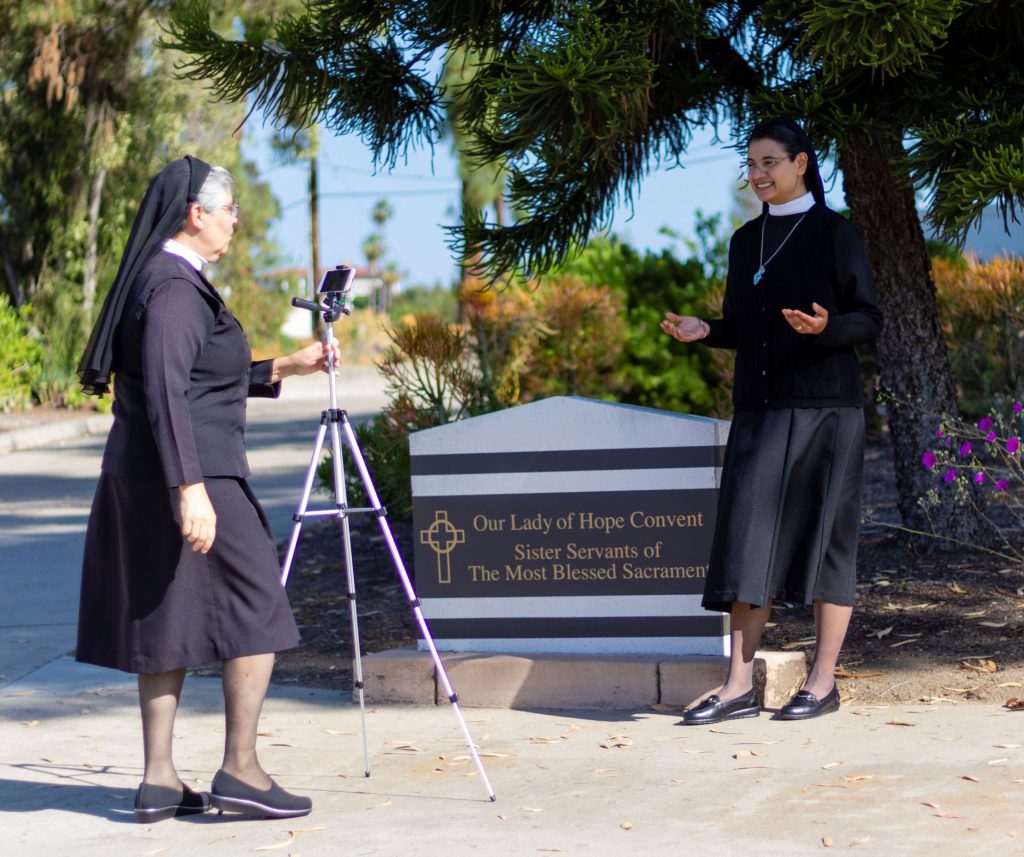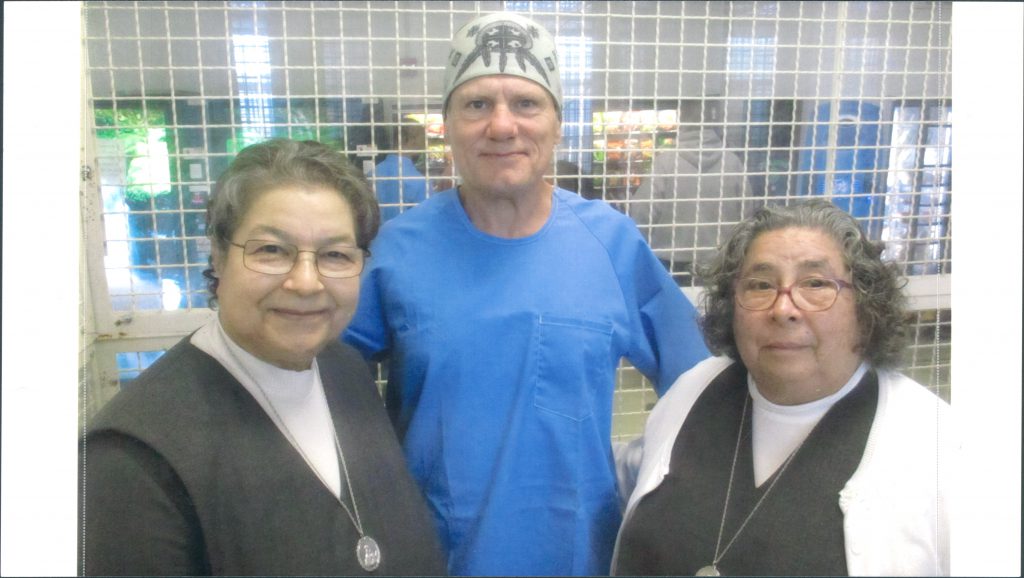By Marissa Romero
SAN DIEGO — Women religious have adopted technology and innovative humanitarian strategies to keep their ministries running during the COVID-19 crisis. But more than ever, they are relying on the power of prayer.
One of them is Sister Madeline Fitzgerald, OSC, from the congregation of Sisters of Saint Clare, who leads the adult formation ministry RCIA at St. Francis of Assisi Parish in Vista.
Sister Fitzgerald now reaches out to the RCIA candidates via Skype, text, e-mail, Zoom videoconferencing. She provides links to websites, such as formed.org from the Augustine Institute, and stpaulcenter.com for Bible study, among others, to enrich the candidate’s Catholic formation. They complete their weekly lessons, including viewing the Sunday Mass online, prayers and reflections, and submit assignments to her.
Sister Fitzgerald is no stranger to the anxiety and suffering caused by the pandemic. Her 81-year-old first cousin, James Fitzgerald, was recently released from a hospital in Danbury, Conn., after 32 days of fighting the coronavirus. He is now at a nursing home with a feeding tube, she said, experiencing firsthand the power of prayer.
“People feel consoled, comforted and at peace when they know they are backed by prayer warriors,” she said. “Prayer can move mountains, that is how powerful prayer is.”
Sister Maureen Brown, CSJ, from the congregation of Sisters of St. Joseph of Carondelet, leads a bereavement ministry team of 10 parishioners at St. Thomas More Parish in Oceanside. They seek to bring consolation to families mourning the death of a loved one, and prepare the funeral Masses.
“It is difficult for me and for my team not to be able to meet with (bereaved families) face-to-face to offer the type of comfort and support that only a personal meeting can provide,” said Sister Brown, since such meetings are no longer permitted during the health crisis.
Instead, she phones family members while they are waiting to celebrate their loved one’s funeral Mass. Her goal is to bring them consolation during their grieving process.
“The Resurrected Christ is with us and will always be — alleluia!” she said.
She spends more time in prayer for the needs of our “global village,” said Sister Brown. “God is with us and will bring us through!”
Sister Katia A. Chávez, SJS, from the congregation of Sister Servants of the Blessed Sacrament, serves as an assistant for director of vocations. She recognizes how the pandemic has challenged the ministry.
“COVID-19 has impelled us to think differently about our ministry in responding to the changing times,” she said.
Her team has moved the vocations ministry to electronic platforms. They created a YouTube channel to deliver clips on religious discernment to women wanting to learn about religious life considering a vocation.
“Videos have been posted in English and Spanish which have been well received,” said Sister Chávez.
Women exploring religious life are connecting with her team through social media. In fact, her team is able to reach more women by using the Internet, but acknowledges that face-to-face interactions are the best way to promote religious life.
Sister Chávez’s community is focusing their prayers on intentions on the pandemic.
“During the rosary we ask Our Lady of Health to intercede for us,” she said. “We pray for the leaders of our Church and the leaders of the world so that they may receive wisdom in guiding the people of God.”
Sister Maria Eugenia Espinoza, MFP, from the congregation of Franciscan Missionaries of Our Lady of Peace, continues to work in her ministries at the Mission Office in San Diego and at La Casa de Los Pobres in Tijuana, mainly supported by donations from people in the San Diego area. The Casa’s 63-year mission is to provide the city’s poorest residents with essential aid, such as breakfast, groceries, medical attention and clothing.
The Franciscan sisters prepare and distribute an average of 800 breakfasts Monday to Friday. Tijuana police ordered them to stop serving them in the patio because people were not observing social distancing rules. They came up with a solution: distribute the breakfast in paper bags “to go” to continue providing this support.
In addition, the sisters also distribute about 450 bags of groceries every week to families without income.
Doctors deliver medical services on the weekly basis to an average of 250 persons, including children. The organization covers the cost of medicine.
“I pray every day for all the people who care for the sick,” said Sister Fitzgerald. “They are our heroes! God Bless them all and keep them safe.”
From the congregation of the Adrian Dominican Sisters, Sister Pat Erickson, OP, is facing a different reality.
Her ministry includes volunteering in migrant shelters in Tijuana, but due to preexisting health conditions and issues crossing the U.S.-Mexico border, she is unable to continue this work. “Every day I wonder how the people are doing in the shelters in Tijuana,” said Sister Erickson. “Every day I get the urge to go to Tijuana just so I can see the people, to be with them…but I know that I can’t.”
She reflected about how people live side by side in the Tijuana shelters, realizing how vulnerable they are.
“My sisters and I pray daily during the liturgy of the hours and the rosary for all the people affected by COVID-19,” said Sister Chávez. “We pray for the dead, for those battling with the illness, for their families, for those who take care of them.”






